- Home
- Frank Herbert
Dune dc-1 Page 9
Dune dc-1 Read online
Page 9
“It’s a thing my Wanna might have said,” he murmured. And this, too, was truth. He put a hand to his mouth, swallowing convulsively. He had never been closer to speaking out, confessing his secret role.
Jessica spoke, shattering the moment. “Besides, Wellington, the Duke is really two men. One of them I love very much. He’s charming, witty, considerate … tender—everything a woman could desire. But the other man is … cold, callous, demanding, selfish—as harsh and cruel as a winter wind. That’s the man shaped by the father.” Her face contorted. “If only that old man had died when my Duke was born!”
In the silence that came between them, a breeze from a ventilator could be heard fingering the blinds.
Presently, she took a deep breath, said, “Leto’s right—these rooms are nicer than the ones in the other sections of the house.” She turned, sweeping the room with her gaze. “If you’ll excuse me, Wellington, I want another look through this wing before I assign quarters.”
He nodded. “Of course.” And he thought: If only there were some way not to do this thing that I must do.
Jessica dropped her arms, crossed to the hall door and stood there a moment, hesitating, then let herself out. All the time we talked he was hiding something, holding something back, she thought. To save my feelings, no doubt. He’s a good man. Again, she hesitated, almost turned back to confront Yueh and drag the hidden thing from him. But that would only shame him, frighten him to learn he’s so easily read. I should place more trust in my friends.
***
Many have marked the speed with which Muad‘Dib learned the necessities of Arrakis. The Bene Gesserit, of course, know the basis of this speed. For the others, we can say that Muad’Dib learned rapidly because his first training was in how to learn. And the first lesson of all was the basic trust that he could learn. It is shocking to find how many people do not believe they can learn, and how many more believe learning to be difficult. Muad‘Dib knew that every experience carries its lesson.
—from “The Humanity of Muad’Dib” by the Princess Irulan
PAUL LAY on the bed feigning sleep. It had been easy to palm Dr. Yueh’s sleeping tablet, to pretend to swallow it. Paul suppressed a laugh. Even his mother had believed him asleep. He had wanted to jump up and ask her permission to go exploring the house, but had realized she wouldn’t approve. Things were too unsettled yet. No. This way was best.
If I slip out without asking I haven’t disobeyed orders. And Iwill stay in the house where it’s safe.
He heard his mother and Yueh talking in the other room. Their words were indistinct—something about the spice … the Harkonnens. The conversation rose and fell.
Paul’s attention went to the carved headboard of his bed—a false headboard attached to the wall and concealing the controls for this room’s functions. A leaping fish had been shaped on the wood with thick brown waves beneath it. He knew if he pushed the fish’s one visible eye that would turn on the room’s suspensor lamps. One of the waves, when twisted, controlled ventilation. Another changed the temperature.
Quietly, Paul sat up in bed. A tall bookcase stood against the wall to his left. It could be swung aside to reveal a closet with drawers along one side. The handle on the door into the hall was patterned on an ornithopter thrust bar.
It was as though the room had been designed to entice him.
The room and this planet.
He thought of the filmbook Yueh had shown him—“Arrakis: His Imperial Majesty’s Desert Botanical Testing Station.” It was an old filmbook from before discovery of the spice. Names flitted through Paul’s mind, each with its picture imprinted by the book’s mnemonic pulse: saguaro, burro bush, date palm, sand verbena, evening primrose, barrel cactus, incense bush, smoke tree, creosote bush … kit fox, desert hawk, kangaroo mouse….
Names and pictures, names and pictures from man’s terranic past—and many to be found now nowhere else in the universe except here on Arrakis.
So many new things to learn about—the spice.
And the sandworms.
A door closed in the other room. Paul heard his mother’s footsteps retreating down the hall. Dr. Yueh, he knew, would find something to read and remain in the other room.
Now was the moment to go exploring.
Paul slipped out of the bed, headed for the bookcase door that opened into the closet. He stopped at a sound behind him, turned. The carved headboard of the bed was folding down onto the spot where he had been sleeping. Paul froze, and immobility saved his life.
From behind the headboard slipped a tiny hunter-seeker no more than five centimeters long. Paul recognized it at once—a common assassination weapon that every child of royal blood learned about at an early age. It was a ravening sliver of metal guided by some near-by hand and eye. It could burrow into moving flesh and chew its way up nerve channels to the nearest vital organ.
The seeker lifted, swung sideways across the room and back.
Through Paul’s mind flashed the related knowledge, the hunter-seeker limitations: Its compressed suspensor field distorted the room to reflect his target, the operator would be relying on motion—anything that moved. A shield could slow a hunter, give time to destroy it, but Paul had put aside his shield on the bed. Lasguns would knock them down, but lasguns were expensive and notoriously cranky of maintenance—and there was always the peril of explosive pyrotechnics if the laser beam intersected a hot shield. The Atreides relied on their body shields and their wits.
Now, Paul held himself in near catatonic immobility, knowing he had only his wits to meet this threat.
The hunter-seeker lifted another half meter. It rippled through the slatted light from the window blinds, back and forth, quartering the room.
I must try to grab it, he thought. The suspensor field will make it slippery on the bottom. I must grip tightly.
The thing dropped a half meter, quartered to the left, circled back around the bed. A faint humming could be heard from it.
Who is operating that thing? Paul wondered. It has to be someone near. I could shout for Yueh, but it would take him the instant the door opened.
The hall door behind Paul creaked. A rap sounded there. The door opened.
The hunter-seeker arrowed past his head toward the motion.
Paul’s right hand shot out and down, gripping the deadly thing. It hummed and twisted in his hand, but his muscles were locked on it in desperation. With a violent turn and thrust, he slammed the thing’s nose against the metal doorplate. He felt the crunch of it as the nose eye smashed and the seeker went dead in his hand.
Still, he held it—to be certain.
Paul’s eyes came up, met the open stare of total blue from the Shadout Mapes.
“Your father has sent for you,” she said. “There are men in the hall to escort you.”
Paul nodded, his eyes and awareness focusing on this odd woman in a sacklike dress of bondsman brown. She was looking now at the thing clutched in his hand.
“I’ve heard of suchlike,” she said. “It would’ve killed me, not so?”
He had to swallow before he could speak. “I … was its target.”
“But it was coming for me.”
“Because you were moving.” And he wondered: Who is this creature?
“Then you saved my life,” she said.
“I saved both our lives.”
“Seems like you could’ve let it have me and made your own escape,” she said.
“Who are you?” he asked.
“The Shadout Mapes, housekeeper.”
How did you know where to find me?”
“Your mother told me. I met her at the stairs to the weirding room down the hall.” She pointed to her right. “Your father’s men are still waiting.”
Those will be Hawat’s men, he thought. We must find the operator of this thing.
“Go to my father’s men,” he said. “Tell them I’ve caught a hunter-seeker in the house and they’re to spread out and find the operator. Tell them
to seal off the house and its grounds immediately. They’ll know how to go about it. The operator’s sure to be a stranger among us.”
And he wondered: Could it be this creature? But he knew it wasn’t. The seeker had been under control when she entered.
“Before I do your bidding, manling,” Mapes said, “I must cleanse the way between us. You’ve put a water burden on me that I’m not sure I care to support. But we Fremen pay our debts—be they black debts or white debts. And it’s known to us that you’ve a traitor in your midst. Who it is, we cannot say, but we’re certain sure of it. Mayhap there’s the hand guided that flesh-cutter.”
Paul absorbed this in silence: a traitor. Before he could speak, the odd woman whirled away and ran back toward the entry.
He thought to call her back, but there was an air about her that told him she would resent it. She’d told him what she knew and now she was going to do his bidding. The house would be swarming with Hawat’s men in a minute.
His mind went to other parts of that strange conversation: weirding room. He looked to his left where she had pointed. We Fremen. So that was a Fremen. He paused for the mnemonic blink that would store the pattern of her face in his memory-prune-wrinkled features darkly browned, blue-on-blue eyes without any white in them. He attached the label: The Shadout Mapes.
Still gripping the shattered seeker, Paul turned back into his room, scooped up his shield belt from the bed with his left hand, swung it around his waist and buckled it as he ran back out and down the hall to the left.
She’d said his mother was someplace down here—stairs … a weirding room.
***
What had the Lady Jessica to sustain her in her time of trial? Think you carefully on this Bene Gesserit proverb and perhaps you will see: “Any road followed precisely to its end leads precisely nowhere. Climb the mountain just a little bit to test that it’s a mountain. From the top of the mountain, you can not see the mountain.”
—from “Muad’Dib: Family Commentaries” by the Princess Irulan
AT THE end of the south wing, Jessica found a metal stair spiraling up to an oval door. She glanced back down the hall, again up at the door.
Oval? she wondered. What an odd shape for a door in a house.
Through the windows beneath the spiral stair she could see the great white sun of Arrakis moving on toward evening. Long shadows stabbed down the hall. She returned her attention to the stairs. Harsh sidelighting picked out bits of dried earth on the open metalwork of the steps.
Jessica put a hand on the rail, began to climb. The rail felt cold under her sliding palm. She stopped at the door, saw it had no handle, but there was a faint depression on the surface of it where a handle should have been.
Surely not a palm lock, she told herself. A palm lock must be keyed to one individual’s hand shape and palm lines. But it looked like a palm lock. And there were ways to open any palm lock—as she had learned at school.
Jessica glanced back to make certain she was unobserved, placed her palm against the depression in the door. The most gentle of pressures to distort the lines—a turn of the wrist, another turn, a sliding twist of the palm across the surface.
She felt the click.
But there were hurrying footsteps in the hall beneath her. Jessica lifted her hand from the door, turned, saw Mapes come to the foot of the stairs.
“There are men in the great hall say they’ve been sent by the Duke to get young master Paul,” Mapes said. “They’ve the ducal signet and the guard has identified them.” She glanced at the door, back to Jessica.
A cautious one, this Mapes, Jessica thought. That’s a good sign.
“He’s in the fifth room from this end of the hall, the small bedroom,” Jessica said. “If you have trouble waking him, call on Dr. Yueh in the next room. Paul may require a wakeshot.”
Again, Mapes cast a piercing stare at the oval door, and Jessica thought she detected loathing in the expression. Before Jessica could ask about the door and what it concealed, Mapes had turned away, hurrying back down the hall.
Hawat certified this place, Jessica thought. There can’t be anything too terrible in here.
She pushed the door. It swung inward onto a small room with another oval door opposite. The other door had a wheel handle.
An air lock! Jessica thought. She glanced down, saw a door prop fallen to the floor of the little room. The prop carried Hawat’s personal mark. The door was left propped open, she thought. Someone probably knocked the prop down accidentally, not realizing the outer door would close on a palm lock.
She stepped over the lip into the little room.
Why an airlock in a house? she asked herself. And she thought suddenly of exotic creatures sealed off in special climates.
Special climate!
That would make sense on Arrakis where even the driest of off-planet growing things had to be irrigated.
The door behind her began swinging closed. She caught it and propped it open securely with the stick Hawat had left. Again, she faced the wheel-locked inner door, seeing now a faint inscription etched in the metal above the handle. She recognized Galach words, read:
“O, Man! Here is a lovely portion of God’s Creation; then, stand before it and learn to love the perfection of Thy Supreme Friend.”
Jessica put her weight on the wheel. It turned left and the inner door opened. A gentle draft feathered her cheek, stirred her hair. She felt change in the air, a richer taste. She swung the door wide, looked through into massed greenery with yellow sunlight pouring across it.
A yellow sun? she asked herself. Then: Filter glass!
She stepped over the sill and the door swung closed behind.
“A wet-planet conservatory,” she breathed.
Potted plants and low-pruned trees stood all about. She recognized a mimosa, a flowering quince, a sondagi, green-blossomed pleniscenta, green and white striped akarso … roses….
Even roses!
She bent to breathe the fragrance of a giant pink blossom, straightened to peer around the room.
Rhythmic noise invaded her senses.
She parted a jungle overlapping of leaves, looked through to the center of the room. A low fountain stood there, small with fluted lips. The rhythmic noise was a peeling, spooling arc of water falling thud-a-gallop onto the metal bowl.
Jessica sent herself through the quick sense-clearing regimen, began a methodical inspection of the room’s perimeter. It appeared to be about ten meters square. From its placement above the end of the hall and from subtle differences in construction, she guessed it had been added onto the roof of this wing iong after the original building’s completion.
She stopped at the south limits of the room in front of the wide reach of filter glass, stared around. Every available space in the room was crowded with exotic wet-climate plants. Something rustled in the greenery. She tensed, then glimpsed a simple clock-set servok with pipe and hose arms. An arm lifted, sent out a fine spray of dampness that misted her cheeks. The arm retracted and she looked at what it had watered: a fern tree.
Water everywhere in this room—on a planet where water was the most precious juice of life. Water being wasted so conspicuously that it shocked her to inner stillness.
She glanced out at the filter-yellowed sun. It hung low on a jagged horizon above cliffs that formed part of the immense rock uplifting known as the Shield Wall.
Filter glass, she thought. To turn a white sun into something softer and more familiar. Who could have built such a place? Leto? It would be like him to surprise me with such a gift, but there hasn’t been time. And he’s been busy with more serious problems.
She recalled the report that many Arrakeen houses were sealed by airlock doors and windows to conserve and reclaim interior moisture. Leto had said it was a deliberate statement of power and wealth for this house to ignore such precautions, its doors and windows being sealed only against the omnipresent dust.
But this room embodied a statement far more signif
icant than the lack of waterseals on outer doors. She estimated that this pleasure room used water enough to support a thousand persons on Arrakis—possibly more.
Jessica moved along the window, continuing to stare into the room. The move brought into view a metallic surface at table height beside the fountain and she glimpsed a white notepad and stylus there partly concealed by an overhanging fan leaf. She crossed to the table, noted Hawat’s daysigns on it, studied a message written on the pad:
“TO THE LADY JESSICA—
May this place give you as much pleasure as it has given me. Please permit the room to convey a lesson we learned from the same teachers: the proximity of a desirable thing tempts one to overindulgence. On that path lies danger.
My kindest wishes,
MARGOT LADY FENRING”
Jessica nodded, remembering that Leto had referred to the Emperor’s former proxy here as Count Fenring. But the hidden message of the note demanded immediate attention, couched as it was in a way to inform her the writer was another Bene Gesserit. A bitter thought touched Jessica in passing: The Count married his Lady.
Even as this thought flicked through her mind, she was bending to seek out the hidden message. It had to be there. The visible note contained the code phrase every Bene Gesserit not bound by a School Injunction was required to give another Bene Gesserit when conditions demanded it: “On that path lies danger.”
Jessica felt the back of the note, rubbed the surface for coded dots. Nothing. The edge of the pad came under her seeking fingers. Nothing. She replaced the pad where she had found it, feeling a sense of urgency.
Something in the position of the pad? she wondered.
But Hawat had been over this room, doubtless had moved the pad. She looked at the leaf above the pad. The leaf! She brushed a finger along the under surface, along the edge, along the stem. It was there! Her fingers detected the subtle coded dots, scanned them in a single passage:

 Direct Descent
Direct Descent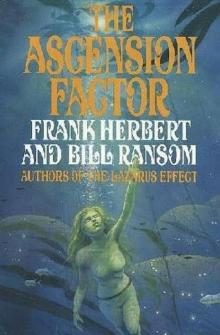 The Ascension Factor
The Ascension Factor The Heaven Makers
The Heaven Makers Children of Dune
Children of Dune Old Rambling House
Old Rambling House Dune
Dune The Worlds of Frank Herbert
The Worlds of Frank Herbert The Jesus Incident
The Jesus Incident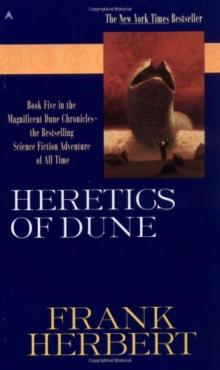 Heretics of Dune
Heretics of Dune Whipping Star
Whipping Star Dune Messiah
Dune Messiah Man of Two Worlds
Man of Two Worlds The Book of Frank Herbert
The Book of Frank Herbert Hunters Of Dune
Hunters Of Dune The Tactful Saboteur
The Tactful Saboteur Soul Catcher
Soul Catcher God Emperor of Dune
God Emperor of Dune The White Plague
The White Plague The Green Brain
The Green Brain The Godmakers
The Godmakers Sandworms of Dune
Sandworms of Dune Destination Void
Destination Void The Dosadi Experiment
The Dosadi Experiment Eye
Eye High-Opp
High-Opp The Eyes of Heisenberg
The Eyes of Heisenberg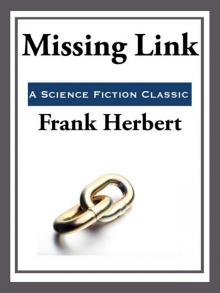 Missing Link
Missing Link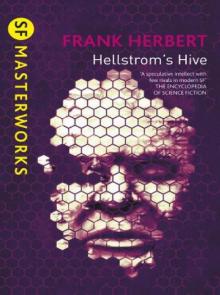 Hellstrom's Hive
Hellstrom's Hive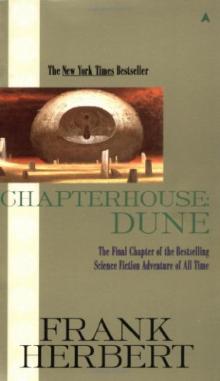 Chapterhouse: Dune
Chapterhouse: Dune The Santaroga Barrier
The Santaroga Barrier The Dragon in the Sea
The Dragon in the Sea Operation Haystack
Operation Haystack A Thorn in the Bush
A Thorn in the Bush Four Unpublished Novels
Four Unpublished Novels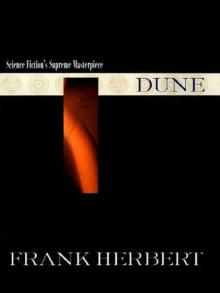 Dune dc-1
Dune dc-1 Jorj X. McKie 1 - Whipping Star
Jorj X. McKie 1 - Whipping Star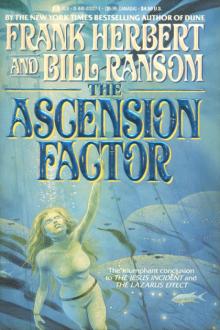 DV 4 - The Ascension Factor
DV 4 - The Ascension Factor Frank Herbert - Dune Book 4 - God Emperor Of Dune
Frank Herbert - Dune Book 4 - God Emperor Of Dune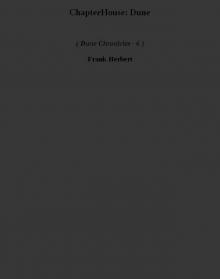 ChapterHouse: Dune dc-6
ChapterHouse: Dune dc-6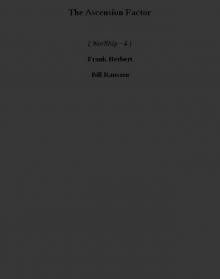 The Ascension Factor w-4
The Ascension Factor w-4 A Game of Authors
A Game of Authors Children of Dune dc-3
Children of Dune dc-3 Destination: Void: Prequel to the Pandora Sequence
Destination: Void: Prequel to the Pandora Sequence The Collected Stories of Frank Herbert
The Collected Stories of Frank Herbert Dune Messiah dc-2
Dune Messiah dc-2 Frank Herbert - Dune Book 5 - Heretics of Dune
Frank Herbert - Dune Book 5 - Heretics of Dune DV 3 - The Lazarus Effect
DV 3 - The Lazarus Effect The Jesus Incident w-2
The Jesus Incident w-2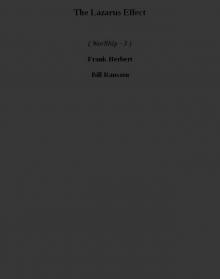 The Lazarus Effect w-3
The Lazarus Effect w-3 Frank Herbert
Frank Herbert The Ascension Factor: Pandora Sequence
The Ascension Factor: Pandora Sequence Dune (40th Anniversary Edition)
Dune (40th Anniversary Edition)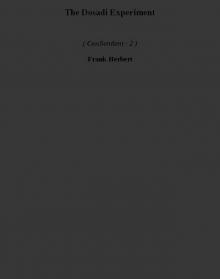 The Dosadi Experiment c-2
The Dosadi Experiment c-2 The Lazarus Effect
The Lazarus Effect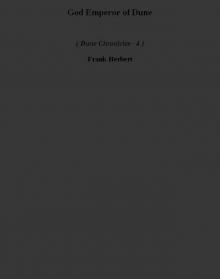 God Emperor of Dune dc-4
God Emperor of Dune dc-4 The Pandora Sequence: The Jesus Incident, the Lazarus Effect, the Ascension Factor
The Pandora Sequence: The Jesus Incident, the Lazarus Effect, the Ascension Factor The Green Brain (v4.0)
The Green Brain (v4.0) The Heaven Makers (v4.0)
The Heaven Makers (v4.0)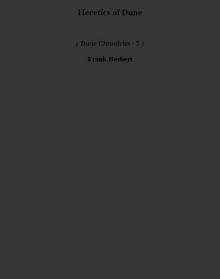 Heretics of Dune dc-5
Heretics of Dune dc-5